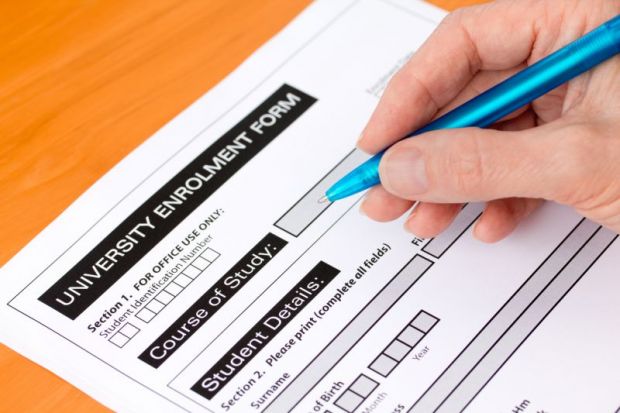US universities face a potential decline in international students and academics next year in light of Donald Trump’s revised travel ban, higher education associations have warned.
The US president signed an executive order on 6 March placing a 90-day ban on the issuance of new visas, including student visas, to citizens of six Muslim-majority countries and a 120-day ban on the entry of all refugees.
Iraq, which was covered in the previous executive order, has been removed from the new ban, but citizens of Iran, Libya, Syria, Somalia, Sudan and Yemen will be affected.
While the reissued ban allows students and scholars from those countries who are already at US campuses to travel freely, there are fears that it will impact enrolments at the start of the next academic year in the autumn.
Peter McPherson, president of the US’s Association of Public and Land-grant Universities, said that during the 2015-16 academic year, more than 15,450 students (see table below) and more than 2,100 scholars from the six countries targeted in the ban studied and conducted research at US universities.
“The pipeline of new students and scholars from those countries – many of whom are in the midst of the college application process – is now cut off,” he said in a statement.
He added that the new order could also have a “chilling effect” on students and scholars in other countries who are considering whether to go to universities in the US or elsewhere. All six of the 2016 US-based Nobel prizewinners in economics and scientific fields were foreign-born, he continued.
The American Association of State Colleges and Universities added that the new order “remains overly broad in scope and threatens to adversely impact higher education in America”.
“While we understand and respect the president’s stated goal of securing our homeland, we also believe that a categorical ban on the entry of individuals based purely on national origin will undermine the ability of our public institutions to attract the best minds to teach and study at our state colleges and universities,” it said.
Several Canadian universities have sought to capitalise on the ban by announcing that they will make it easier for students who cannot travel to the US to study at their institutions instead.
Ahead of Mr Trump’s revised travel ban, the University of New Brunswick declared on 2 March that it would treat applicants affected by the order as refugees, waive their application fees and reduce or waive undergraduate tuition deposits. This will “expedite process, allowing greater flexibility in the treatment of documents and requirements”, it said. The university added that it will also assist affected students in transferring from another institution or transferring credits.
Several other Canadian universities previously said they would waive application fees for affected students following the original executive order, including the University of Calgary, University of Alberta and Simon Fraser University.
Meanwhile, the University of Ottawa said it would implement a tuition fee exemption programme to allow students from the seven countries mentioned in the original ban to study at the same tuition rates as Canadian students.
Number of students in US originating from travel ban countries in 2014-15 and 2015-16
| 2014-15 | 2015-16 | % change | % of all US overseas students (2015-16) | |
| Iran | 11,338 | 12,269 | 8.2% | 1.175% |
| Libya | 1,578 | 1,514 | -4.1% | 0.145% |
| Syria | 792 | 783 | -1.1% | 0.075% |
| Somalia | 32 | 35 | 9.4% | 0.003% |
| Sudan | 233 | 253 | 8.6% | 0.024% |
| Yemen | 516 | 599 | 16.1% | 0.057% |
| Total | 14,489 | 15,453 | 6.7% | 1.480% |
Source: Institute of International Education Open Doors Report on International Educational Exchange (2016)




